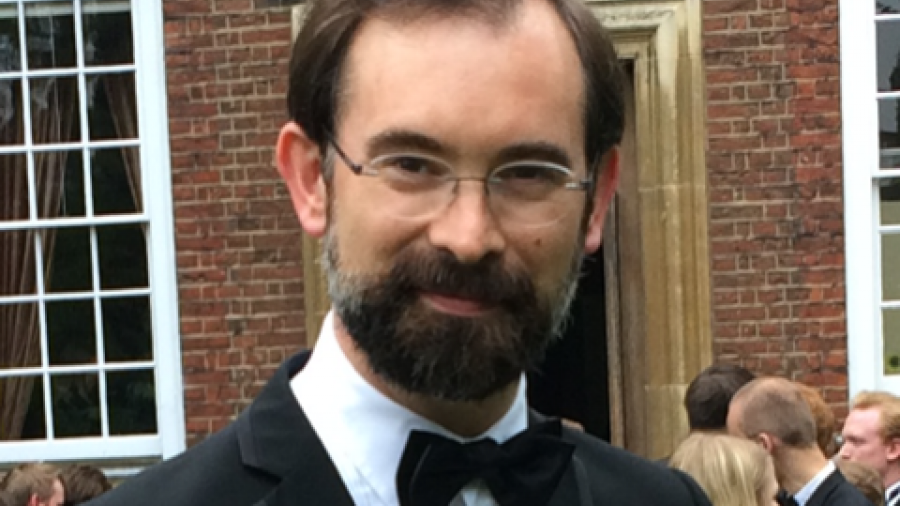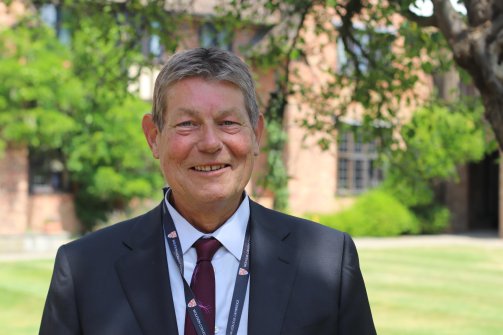New Press Fellows arrive at Wolfson


A new paper by Wolfson Junior Research Fellow (JRF), Dr William Simpson, published in the European Journal for Philosophy of Science, has put forward an exciting new “ontology” for quantum mechanics.

The paper, “Cosmic hylomorphism: a powerist ontology of quantum mechanics,” argues that, if the de Broglie-Bohm interpretation of quantum mechanics is correct, there is just one fundamental thing that exists: the physical cosmos. Everything else, argues Dr Simpson, is an integral part that depends for its physical nature upon the cosmic whole.
Building on arguments he proposed earlier in a British Journal of Philosophy of Science article, Dr Simpson’s paper is unusual in that it resurrects Aristotle’s ancient “hylomorphic” account of physical wholes, attributing the cosmos as a whole with a teleological nature (or “form”) that explains how its physical parts evolve through time.
Professor Michael Esfeld, Full Professor of Philosophy of Science at the University of Lausanne and a former visting scholar of Wolfson College, commended the paper as “an excellent piece of research that brings metaphysics together with science,” stating that he is “delighted to see philosophy of science continuing to flourish at Wolfson”.
We spoke to Dr Simpson to try to find out more, and to discuss everything from the current trends in philosophy to coping with the pandemic and the importance of College life.
Hylomorphism is an ancient philosophical theory about the basic building blocks of nature, which are called ‘substances’. It offers a way of accounting for the possibility of change by analysing substances in terms of their ‘matter’ and ‘form’. According to Aristotle, all change is in a respect, and is a change of an underlying subject. In an accidental change, the underlying thing is the substance, which is said to acquire a new accidental form: for example, when a Cambridge Fellow gains weight at a College feast, it is the Fellow (a substance) who transitions from being slim to being rotund. In a substantial change, the underlying thing is matter, which is said to acquire a new substantial form. When this rotund Fellow passes away and a delicate flower springs up from the mound, it is the matter which is trans-formed into substance of a different nature. The term hylomorphism is a portmanteau of the Greek words for matter (hulê) and form (morphê).
Hylomorphism went out of fashion in the wake of the Scientific Revolution and was replaced by corpuscularianism. Corpuscularians thought that everything could be understood from the bottom up in terms of the properties of material particles, rejecting the role of form in determining the properties of matter. They are the forerunners of contemporary microphysical reductionists, who think the natural world consists of some arrangement of microscopic constituents. According to this philosophy of nature, change is a matter of having different microphysical properties at different times, rather than something becoming different. (The philosopher Peter Geach rather disparagingly christened this ‘mere Cambridge change’!)
Cosmic Hylomorphism says there is just one substance; namely, the physical cosmos. Contrary to the corpuscularians, who rejected Aristotle’s doctrine of hylomorphism, the world is not built of microscopic entities from the ‘bottom up’. Rather, everything in nature — including every microscopic particle — is part of this Cosmic Substance, depending for its existence and nature upon the whole of which it is part. Aristotle didn’t believe the cosmos was a single substance, but I think this is a good way of making sense of the ‘Bohmian’ interpretation of quantum mechanics that originated in the work of the physicists Louis de Broglie and David Bohm.
Hylomorphic Pluralism, on the other hand, says there are multiple substances which exist at different scales. Aristotle thought biological organisms were substances, for example, being composite entities whose various parts derive their identity from the wholes of which they are part. I think there are other interpretations of quantum mechanics, besides the Bohmian interpretation, for which Hylomorphic Pluralism may offer a better fit. I am currently thinking about a recent non-standard interpretation put forward by the physicist Barbara Drossel and the cosmologist George Ellis, which recognises the irreducible role played by macroscopic, thermal properties in any practical applications of quantum mechanics, inviting a possible philosophical interpretation in terms of macroscopic substances. I am sympathetic to this view of nature, in which things at the macroscopic scale – such as you and me – make a causal difference to how the world unfolds.
Philosophers who identify as ‘realists’ are seeking an objective account of the world in which our best scientific theories refer to things which do not depend upon our thoughts or observations for their existence or natures. The philosophy of the last century, which took some time to catch up with quantum physics, was dominated by the view that the ultimate referents are some set of microscopic constituents picked out by our best physics. There can be no question that quantum physics has shaken faith in microphysical reductionism, however, when a physicist like David Mermin can ask, ‘is the moon there when nobody looks?’ I think the price of realism today is the admission that we can’t directly measure or completely control everything that exists (‘nature does not wear all of her properties on her sleeves’). If the Bohmians are right, we can’t track the trajectories of Bohmian particles, although they play a role in making the theory intelligible. If Drossel and Ellis are right, on the other hand, we can’t uncover a single set of universal laws which tell us where all the matter ends up, although we can specify laws that apply in different contexts.
I also think it’s a mistake to suppose that we can read a fundamental ontology (the basic building blocks of reality) off the mathematical structure of our best physics. Physics can tell us about the causal powers of something’s parts, but there is a role for philosophy in discerning the nature of the whole which exercises those causal powers, and this involves a kind of ‘metaphysical abstraction’ from the accidental powers of its parts to that which ultimately determines the nature of the whole. According to Cosmic Hylomorphism, what determines the causal powers of the Bohmian particles is the substantial form of the Cosmic Substance these particles comprise. According to Hylomorphic Pluralism, what determines the causal powers of complex systems are the substantial forms of the different macroscopic substances they comprise. Although substantial forms are intimately connected with the causal powers of substance, they are not something we can physically isolate in a laboratory. They play a metaphysical explanatory role.
It is doing metaphysics of science, insofar as it offers an account of certain general concepts that figure in the sciences which stand in need of some clarification, such as the nature of physical properties, laws and causation. It is doing philosophy of physics, insofar as it offers an account of what the world would be like if a certain physical theory happened to be true. It is not an explicitly theological paper, but I think the discussion can be taken in a theological direction.
On the one hand, you might try to understand the Cosmic Substance posited in the theory of Cosmic Hylomorphism along the lines of the philosopher Baruch Spinoza (who inspired the physicist Albert Einstein), adopting a purely immanent conception of God in which everything in nature is part of the divine and in a process of self-realisation. On the other hand, I think the theory of Hylomorphic Pluralism, which claims that nature is built of a plurality of substances, is more hospitable to the kind of ‘classical theism’ that the medieval philosopher and theologian Thomas Aquinas advanced. Classical theism offers a unified, non-regressive explanation of the existence of this plurality of substances, in which these substances ‘participate’ in a single necessary being and their forms exemplify the divine ‘ideas’.
The theologian Andrew Davison (Cambridge) has recently given an accessible account of how everything ‘participates’ in God which is compatible with hylomorphism and draws heavily on Aquinas (“Participation in God: A Study in Christian Doctrine and Metaphysics”, CUP 2019). I am also currently working on an edited collection of analytic philosophy, with the metaphysician Robert Koons (Texas) and the philosopher of religion James Orr (Cambridge), called ‘Neo-Aristotelian Metaphysics and the Theology of Nature’, which includes discussions of how the basic building blocks of nature may be said to be ‘grounded’ in (or participate in) the divine. This work is part of a more general revival of interest in Aristotle’s philosophy of nature (both in mainstream metaphysics and the philosophy of science), to which I've been seeking to contribute in various ways. It’s an exciting movement that spans multiple domains of philosophy and there is plenty of work to be done.
If by 'pure philosophy' you mean a rationalist approach to reality that is void of empirical content, then I have some definite misgivings. This kind of rationalism isn’t just a failing of prescientific philosophers. Physicists who spend too much time at their blackboards and not enough time doing experiments can be guilty of such an approach. If the world were made of “algebra stuff”, for instance, as one physicist has claimed, I doubt we could ever come to know the truth of this claim by engaging in scientific inquiry. Aristotle, on the other hand, was a protoscientist who studied nature and made observations, believing that the principles of nature are not abstract mathematical entities that exist in another realm but are immanent within the world of change.
But perhaps by ‘pure philosophy’ you mean what some people call ‘first philosophy’, which inquires into the nature of being as such. I think this is making a comeback in the form of discussions about what it is for something to be ‘fundamental', and I think this is a good thing. Scientific inquiry involves philosophical assumptions about the reality of the world — about things, causes, and change, etc — and our best physical theories deploy background concepts that they do not themselves explain. It’s naïve to think we can read reality off the mathematical structures of our best physics without paying attention to how physical theories are used to explain things in practice, and without recourse to the conceptual resources of philosophy.
The philosopher Wilfrid Sellars famously characterised the aim of philosophy as trying “to understand how things in the broadest possible sense of the term hang together in the broadest possible sense of the term.” To get the balance right, I suggest, we should think of this very general form of inquiry as incorporating both empirical and conceptual activities. When we don’t take the conceptual work seriously, we end up with scientists pontificating about ethics and religion in incoherent and embarrassing ways. When we don’t take the empirical work seriously, we get philosophers vainly attempting to intuit the number of planets without leaving their fusty armchairs. Both of these extremes produce reactions which fragment the academy and divide society, pitching the sciences against the humanities and technical expertise against common sense. To take in the reality of the natural world we must learn to ‘breathe with both lungs’.
I have had plenty of writing to do, and find I have hardly noticed the passage of time. I am keeping productive and enjoying walks in the countryside. I have recently taken up drawing, which I had never seriously attempted to do before – sometimes sketches of figures of the past who happen to inspire me. I have also been enjoying novels and reading to others, to maintain a sense of personal connection. During the first lockdown, I narrated ‘The Screwtape Letters’ by C.S. Lewis for Wolfson College, which I shared online.
I acquired a disposition for philosophy and theology from my father (but not all of his opinions), who trained for the Catholic priesthood before settling on a different course of life. Yet I was also good at the sciences at school, and found myself troubled by the assertion that they exhaust our knowledge about reality (a widespread ideology which is called ‘scientism’), disenchanting the world and displacing the cognitive contribution of the humanities. I decided I needed to study quantum physics at university, not only because it fascinated me, but because I found it was continually being invoked in intellectual battles as a kind of trump card for justifying nonsensical things, usually by people who didn’t know much about it but had some sort of axe to grind.
Unfortunately, many physicists today take the attitude that you should just ‘shut up and calculate’ (was it Mermin or Feynman who said that?). I enjoyed calculating, but found it impossible to shut up. (Apparently, so did Feynman.) Fortunately, some of the great pioneer physicists of the early twentieth century, like Einstein and Heisenberg, were more philosophically minded, and some remarks made by Heisenberg lead me to start reading Aristotle’s metaphysics. If you’re interested in sorting out your thoughts about reality, you can’t avoid doing philosophy, and if you’re going to do it, you might as well learn to do it well. This involves recognising that other people have asked the same kinds of questions before, and trying to take on board what they have thought about them (and why they thought as they did). I still feel that I’m a beginner.
I think College is an integral part of academic life in Cambridge, not only socially but intellectually: it is all too easy for academics to drift into increasingly narrow specialisations, to remain ignorant about everything else, and to become rather boring careerists! Unfortunately, the coronavirus pandemic struck shortly after I finished my doctorate in philosophy at Peterhouse, and just before I officially took up my fellowship at Wolfson. I have mostly been working from home and have so far spent little time in College, but I'm looking forward to getting to know Wolfson better once some degree of normality has been restored.
It can be a struggle to ‘switch off’, I shan't deny, but I find it helps to keep a regular routine. I get up early and retire at the same time every day. I pray Lauds, Vespers and Compline, and I keep regular mealtimes. Our mental resources are finite and easily squandered by trivia, but maintaining what monastics call a ‘liturgical life’ frees the mind to focus its energies on those little things where you have some chance of making a helpful and interesting contribution.







